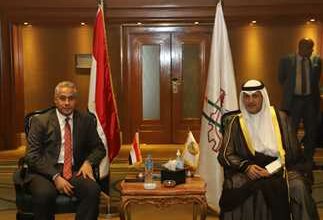Egypt has not had a workers' party since the 1940s, but, like many other things the revolution has revived, these entities are coming back to life.
Over the past five years, workers and labor activists nationwide have loudly advocated for the establishment of a workers' party and now they are organizing groups including the Democratic Workers' Party, the Revolutionary Workers' Coalition, and the Popular Coalition Party.
Numerous groups have adopted the "workers’ party" or "labor party" label since the 1920s, but their platforms, constituencies and leaders have either not been genuinely labor-based, or have been led by vanguards rather than workers.
Yet establishing a genuine labor party may be more difficult than ever given the legal restrictions imposed by the provisions of the interim constitution, and the new Political Parties Law issued on 29 March. Under these laws, the establishment of class-based parties is strictly prohibited.
Nonetheless, thousands of workers and labor activists are struggling to overcome these restrictions to establish a party which democratically represents their interests.
Activist Kamal Khalil, who plays a pivotal role in the establishment of the Democratic Workers’ Party, questioned the new legal restrictions.
Khalil, an engineer and the leader of the Revolutionary Socialists group, told Al-Masry Al-Youm, "Workers' parties are allowed for by law in countries around the world, and they have had a major historical influence in the democratic politics of states including the UK and Brazil, among countless others."
"I don't know how the authorities will react to the (de facto) establishment of a class-based party, but then again we're not too concerned about that. We don't want a party based on paper, we want a party based in factories and workplaces," he said.
He pointed to new legal hurdles to forming a party, including the requirement of letters of notarization from at least 5,000 members in different governorates across the country. Under the previous Political Parties Law (Law no. 40 of 1977), only 50 founding members were required to establish a party.
"Whether or not the law allows it, we shall continue to work toward the establishment of the Democratic Workers' Party,” he said. “Striking workers across Egypt have, since December 2006, been demanding the establishment of a party which represents them, and which protects their interests."
The engineer explained that party membership is open to anyone who labors for a wage in the public, private or informal sectors regardless of whether they are professionals, small businessmen, farmers, students, pensioners or unemployed.
Hundreds have joined the party including textile workers from the Nile Delta cities of Mahalla, Tanta and Kafr al-Dawwar, Real Estate Tax Authority employees, cement factory workers, railroad workers and nurses, as well as bus drivers, conductors, mechanics, and engineers employed at the Public Transport Authority.
The Democratic Workers' Party is currently said to have some 1000 members across Egypt, primarily from Greater Cairo and the Nile Delta. Its draft program includes demands for radical agricultural reforms, rent/lease controls on farmlands, and governmental subsidies for seeds.
Despite its grassroots agenda, numerous claims of 'vanguardism' have been leveled against the party, with skeptics saying it represents the interests of socialist intellectuals rather than workers. Responding to these claims Khalil said "if this was a vanguard’s party we would've named it the Socialist Labor Party, or the Communist Workers' Party, and its agenda would have been geared toward revolutionary socialism rather than reform."
Khalil said "…we want to engage workers in political life. We want the laboring classes to join the political scene. Our goal is to support a more active role for workers and farmers in the revolution. We want a popular party, not a party led by socialist intellectuals."
Kamal al-Fayyoumy, a labor-activist and textile worker at state-owned Egyptian Spinning and Weaving Company in Mahalla, is another founding member of the Democratic Workers' Party. According to al-Fayyoumy
"We are coordinating with others to establish a nationwide minimum wage of LE1200 (around $US200) per month, to establish trade unions independent of state control, and to improve working conditions in all companies and factories," he said.
Workers in Mahalla are struggling to have privatized companies, including the Omar Effendi chain of department stores, Indorama Shebin Textile Company, Tanta Flax & Oils Company, cement companies, and others, return to the Egyptian public sector, he said.
Al-Fayyoumy also pointed to the draft program of the Democratic Workers' Party, which calls for combating administrative corruption and reevaluating Egypt’s economic ties to Israel including gas exports and Qualified Industrial Zones.
The Revolutionary Workers' Coalition is another fledgling labor organization.
Socialist activist Fatma Ramadan, a labor organizer and industrial safety inspector at Giza's Manpower Bureau, is one of the leaders of the coalition.
"We are not seeking party-status, but rather coordination among workers, farmers, NGOs and parties for the realization of the rights of all laborers, regardless of their political affiliations" said Ramadan.
The Revolutionary Workers' Coalition convened for it preparatory conference on 8 April, and issued a statement of basic principles. Their statement calls for the revolution to uphold social justice and protect workers’ rights to strike, to establish independent unions, and to earn a monthly minimum wage of LE1200, with the maximum salary for administrators not more than ten times the minimum wage
Ramadan said the coalition is not competing with the Democratic Workers' Party and advocated cooperation among labor groups.
In March, the Islamic Labor Party, a conservative-populist group whose activities had been halted by the former regime since May 2000, was also authorized to resume its work. The party was established in 1986 as the successor to the so-called Socialist Labor Party (established in 1978), and the fascist-leaning Young Egypt Party (established in 1933).
Representatives of another labor group, the Popular Coalition Party, could not be reached for comment on their objectives and efforts.




